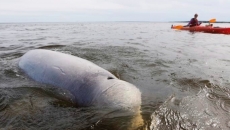OTTAWA - Some Indigenous advocates and leaders say they don't know who Prime Minister Justin Trudeau is talking about when he says Ottawa is doing consultations over a ruling that affirms the need to compensate First Nations children.
Trudeau made the statement earlier this week while visiting the Tk'emlúps te Secwépemc in British Columbia.
Time is ticking down on a 30-day legal window for the Liberal government to appeal a decision released by the Federal Court on Sept. 29 upholding rulings by a human rights tribunal around services and compensation for First Nations children.
Speaking about the ruling in B.C., Trudeau said "we are consulting with Indigenous partners and leaders" and looking at the "implications" of the decision.
Cindy Blackstock, executive director of the First Nations Child and Family Caring Society of Canada, one of the litigants, says that comment came as a surprise because her group hasn’t heard anything.
Congress of Aboriginal Peoples National Chief Elmer St. Pierre says it hasn’t been consulted despite being an intervener in the case involving the expansion of Jordan's Principle, a rule stating Ottawa steps in when there's disagreement about which level of government provides service to a First Nations child.
“All I can say is everyone I’ve spoken with, no one’s heard anything, so I don’t know who they’re talking to, but the bottom line is the most important people to talk to are those who are actually in the courtroom," Blackstock said Wednesday.
Requests for comment to the Prime Minister's Office and Indigenous Services Canada have yet to be returned.
In September 2019, the Canadian Human Rights Tribunal ordered the federal government to pay $40,000 to each First Nations child removed from their home after 2006, as well as to their parents, after earlier ruling Ottawa had discriminated against Indigenous children by knowingly underfunding child and family services on reserve.
It was estimated that around 54,000 children and their parents could be eligible to receive compensation, which would likely cost the federal government more than $2 billion.
Cora Morgan, First Nations family advocate with the Assembly of Manitoba Chiefs, says she found it interesting the Federal Court's ruling to uphold this decision was released on the eve of the country's first National Day for Truth and Reconciliation, designed to honour survivors sent to the residential school system.
She says the assembly hasn't been consulted despite the fact Manitoba has the highest rate of First Nations children in the provincial child and family system.
“It’s one thing to engage leadership, but it’s another thing to also engage the people that are affected. There are thousands and thousands of children currently in the child welfare system, there are thousands that have aged out of the child welfare system. We know our prisons and jails are filled with First Nations people that were formerly in the child welfare system," she said.
“In Winnipeg right now we have a homeless population that’s exploded and a majority of those are children that have aged out of the child welfare system. There’s all these negative impacts on our people that should be accounted for when we’re looking at these landmark rulings."






